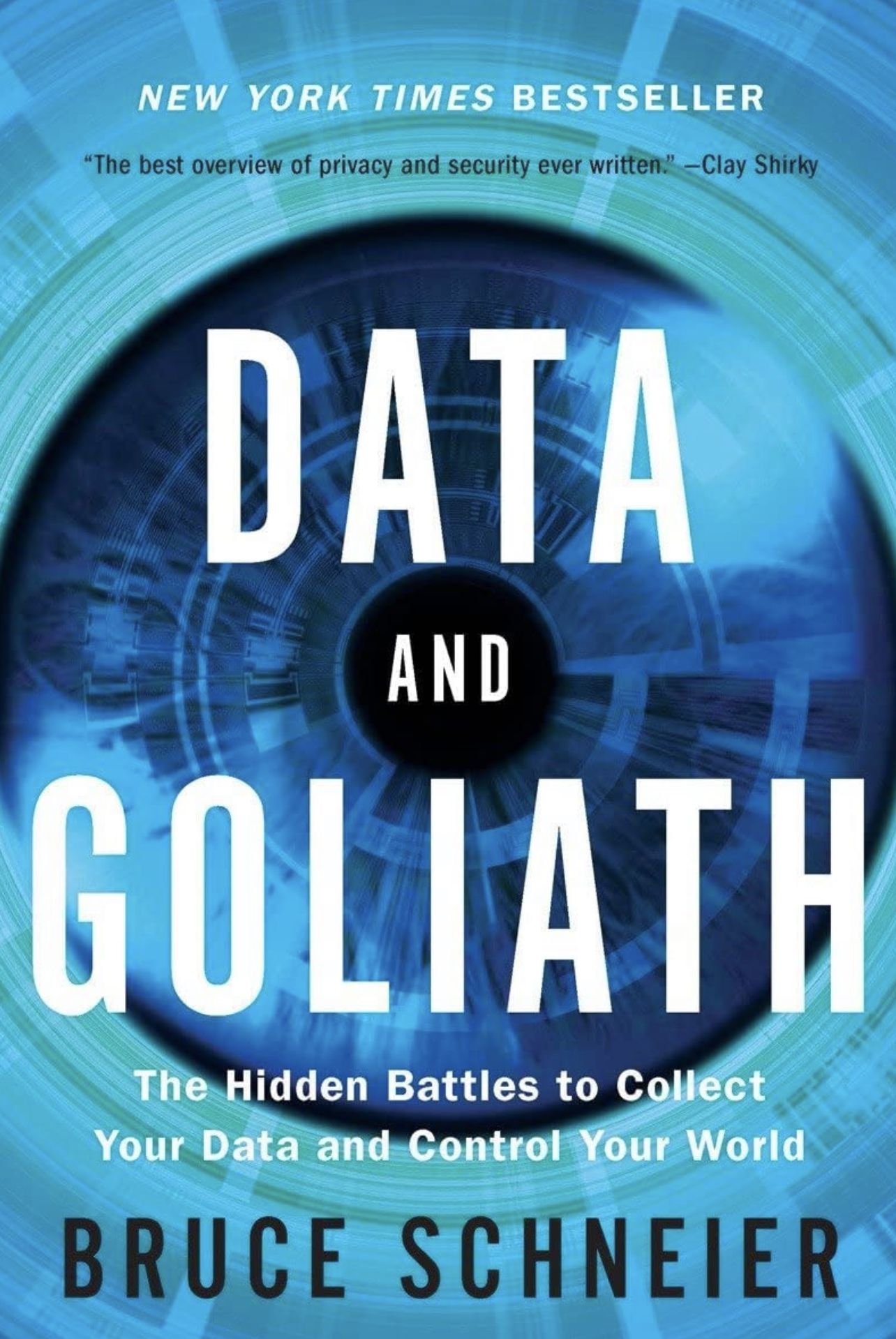← Data and Goliath The Hidden Battles to Collect Your Data and Control Your World
Data and Goliath The Hidden Battles to Collect Your Data and Control Your World

Author: Bruce Schneier Publisher: New York, NY: W. W. Norton & Company. Publish Date: 2015-3 Review Date: Status:📚
Annotations
-
Highlight(pink) - Location 950 One of the early tropes of the Internet was that it would eliminate traditional corporate middlemen. No longer would you have to rely on a newspaper to curate the day’s news and provide it to you in an easy-to-read paper package. You could go out and design your own newspaper, taking bits from here and there, creating exactly what you wanted.
-
Highlight(pink) - Location 953 Similarly, no longer would you have to rely on centralized storefronts to accumulate and resell collectibles;
-
Highlight(pink) - Location 959 These new companies might have broken the traditional power blocs of antique stores, newspapers, and taxi companies, but by controlling the information flow between buyers and sellers they have become powerful middlemen themselves.
-
Highlight(pink) - Location 961 We’re increasingly seeing new and old middlemen battle in the marketplace: Apple and its iTunes store versus the music industry, Amazon versus the traditional publishing industry, Uber versus taxi companies. The new information middlemen are winning.
-
Highlight(pink) - Location 963 Google CEO Eric Schmidt said it: “We believe that modern technology platforms, such as Google, Facebook, Amazon and Apple, are even more powerful than most people realize… , and what gives them power is their ability to grow—specifically, their speed to scale. Almost nothing, short of a biological virus, can scale as quickly, efficiently or aggressively as these technology platforms and this makes the people who build, control, and use them powerful too.”
-
Highlight(pink) - Location 966 What Schmidt is referring to is the inherently monopolistic nature of information middlemen. A variety of economic effects reward first movers, penalize latecomer competitors, entice people to join the largest networks, and make it hard for them to switch to a competing system. The result is that these new middlemen have more power than those they replaced.
-
Highlight(pink) - Location 969 Google controls two-thirds of the US search market. Almost three-quarters of all Internet users have Facebook accounts. Amazon controls about 30% of the US book market, and 70% of the e-book market. Comcast owns about 25% of the US broadband market.
-
Highlight(pink) - Location 971 These companies have enormous power and control over us simply because of their economic position.
-
Highlight(pink) - Location 972 They all collect and use our data to increase their market dominance and profitability.
-
Highlight(pink) - Location 976 Increasingly, companies use their power to influence and manipulate their users.
-
Highlight(pink) - Location 977 Websites that profit from advertising spend a lot of effort making sure you spend as much time on those sites as possible, optimizing their content for maximum addictiveness.
-
Highlight(pink) - Location 978 The few sites that allow you to opt out of personalized advertising make that option difficult to find.
-
Highlight(pink) - Location 980 Our relationship with many of the Internet companies we rely on is not a traditional company–customer relationship. That’s primarily because we’re not customers. We’re products those companies sell to their real customers.
-
Highlight(pink) - Location 982 The relationship is more feudal than commercial. The companies are analogous to feudal lords, and we are their vassals, peasants, and—on a bad day—serfs. We are tenant farmers for these companies, working on their land by producing data that they in turn sell for profit.
-
Highlight(pink) - Location 988 it’s becoming increasingly difficult to not pledge allegiance to at least one of them.
-
Highlight(pink) - Location 989 After all, customers get a lot of value in having feudal lords. It’s simply easier and safer for someone else to hold our data and manage our devices.
-
Highlight(pink) - Location 996 In this new world of computing, we’re no longer expected to manage our computing environment. We trust the feudal lords to treat us well and protect us from harm. It’s all a result of two technological trends.
-
Highlight(pink) - Location 997 The first is the rise of cloud computing. Basically, our data is no longer stored and processed on our computers. That all happens on servers owned by many different companies. The result is that we no longer control our data.
-
Highlight(pink) - Location 999 These companies access our data—both content and metadata—for whatever profitable purpose they want. They have carefully crafted terms of service that dictate what sorts of data we can store on their systems, and can delete our entire accounts if they believe we violate them. And they turn our data over to law enforcement without our knowledge or consent. Potentially even worse, our data might be stored on computers in a country whose data protection laws are less than rigorous.
-
Highlight(pink) - Location 1003 The second trend is the rise of user devices that are managed closely by their vendors: iPhones, iPads, Android phones, Kindles, ChromeBooks, and the like. The result is that we no longer control our computing environment. We have ceded control over what we can see, what we can do, and what we can use.
-
Highlight(pink) - Location 1005 Apple has rules about what software can be installed on iOS devices. You can load your own documents onto your Kindle, but Amazon is able to delete books it has already sold you. In 2009, Amazon automatically deleted some editions of George Orwell’s Nineteen Eighty-Four from users’ Kindles because of a copyright issue. I know, you just couldn’t write this stuff any more ironically.